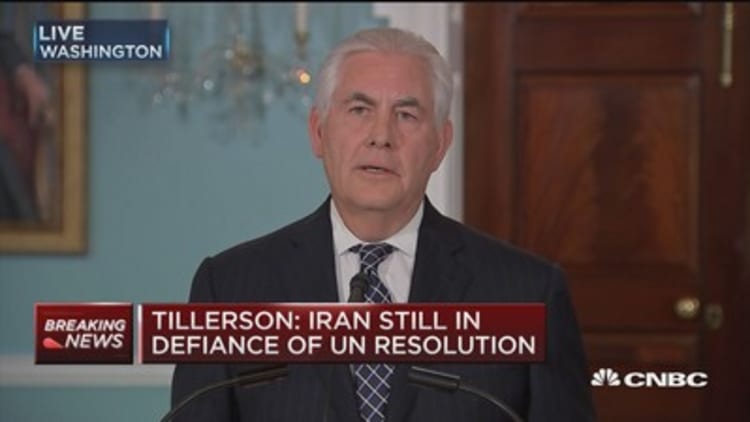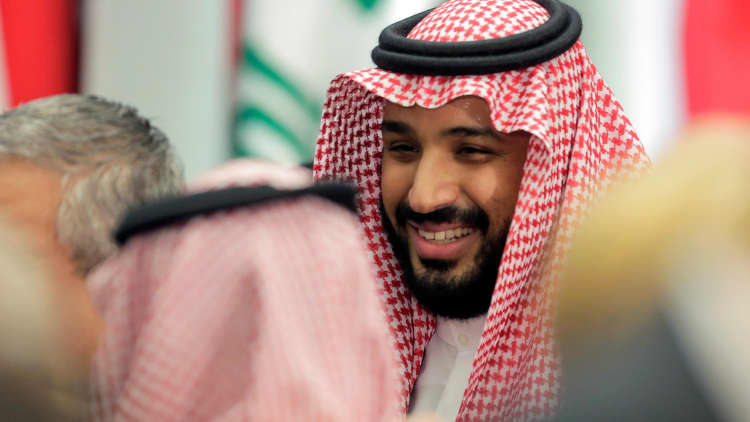As it approaches its first 100 days in the White House, the Trump administration has put Iran "on notice" and imposed new sanctions — and now it is launching a review of a historic accord with Tehran that limits its nuclear program.
That review marks the most strident step toward President Donald Trump's campaign trail threats to pull out of the deal. It will assess whether doing so is in the national interest of the United States in light of a range of American grievances with Iran.
However, those grievances were never meant to be addressed by the nuclear negotiations. Any attempt to scuttle the deal for reasons not spelled out in the accord would likely be viewed as illegitimate by the nations that hammered it out and could potentially spark diplomatic and trade disputes with some of America's closest partners.
How did we get here?
The United States has long taken a tougher stance on Tehran than most countries, implementing a series of sanctions going back to the 1979 Iran hostage crisis. European Union leaders balked at attempts by the State Department to strong-arm European companies into cutting ties with Iran 20 years ago.
The EU and other nations only got on board after evidence of a covert Iranian nuclear program came to light. Beginning in 2006, the United Nations imposed a series of sanctions that instructed Iran to stop enriching uranium and followed up with additional economic measures that pressured Tehran to comply.

These efforts culminated in talks between Iran and the so-called P5+1 — China, France, Germany, Russia, the U.K. and the United States. In 2015, the parties agreed to the Joint Comprehensive Plan of Action, a deal that lifted U.N. sanctions on Iran in exchange for Tehran accepting limits on its nuclear activity and oversight of atomic facilities.
Since the JCPOA was implemented in 2016, Iran has been able to sell its oil more freely, lay the groundwork for much-needed energy sector investment and purchase planes for its aging commercial fleet. However, U.S. influence over the international financial system has made banks skittish about resuming ties with Iran because the United States maintains robust unilateral sanctions against Iran.
What are the Trump administration intentions?
The Trump administration appears to be trying to remedy what it sees as a fundamental flaw in the nuclear negotiations: They limited Iran's nuclear program, but did not address Tehran's human rights record, its support for U.S.-designated terror groups and its role in regional military conflicts.
"I think this was one of the mistakes in how that agreement was put together, is that it completely ignored all of the other serious threats that Iran poses," Secretary of State Rex Tillerson said last week.

However, the narrow focus on Iran's nuclear program is what paved the way for the historic deal. Had the United States insisted on solving all of its grievances with Iran, it's unlikely its European partners, let alone Russia and China, would have agreed to the crippling EU and United Nations sanctions that eventually brought Tehran to the negotiating table.
As a result, the negotiations achieved only a narrow result: limiting Iran's ability to produce a nuclear weapon. While that was a major achievement for most of the parties, it left many American politicians, Republicans especially, bristling at the prospect of sanctions relief for Iran, which would fill its regime's coffers and fund its campaigns in regional conflicts.
How does the United States pull out of the deal?
If Trump decides to withdraw from the deal unilaterally, the accord gives him a path forward. It begins with the United States alleging that Iran is not complying with the terms of the deal, and ends with the country using its veto power as a permanent member of the U.N. Security Council to kill any continued sanctions relief.
But that course of action could have serious ramifications for the United States if other nations believe Washington is trying to scuttle the deal absent cheating on Iran's part.
The Trump administration risks provoking its European partners, China and Russia by threatening to pull out of the deal based on Iranian actions that were never on the agenda during nearly two years of nuclear negotiations that produced the accord.
European, Russian and Chinese companies are also vying for major roles in Iran's oil and gas industry, so their governments are unlikely to reimpose sanctions except in response to clear violations.
It's worth noting that on the day Tillerson announced the review of America's Iran policy, the State Department also certified that Iran was compliant with the nuclear deal.
What about Iran's ballistic missile tests?
The Trump administration has already launched additional U.S. sanctions on Iran over a recent ballistic missile test, but Tehran's weapons development likely doesn't provide the State Department with grounds to snap sanctions back into place.
Iran is not expressly prohibited from testing ballistic missiles. However, a United Nations resolution passed when the organization implemented the nuclear deal "calls upon Iran not to undertake any activity related to ballistic missiles designed to be capable of delivering nuclear weapons."
Reva Goujon, vice president of global analysis at Stratfor, said in a video briefing that the language of the resolution "is squishy by design because the nuclear negotiators knew that Iran would be violating it anyway and wanted to keep that distinct from" the nuclear deal.

However, some analysts say more ballistic missile tests could yield further U.S. sanctions. If those measures go beyond sanctions on a handful of individuals and entities and have a significant effect on Iran's economy, Tehran could pull out of the deal.
An increasingly aggressive stance from Washington also plays into the hands of hard-liners ahead of Iran's presidential elections next month. If a hard-liner unseats relative moderate President Hassan Rouhani, who championed the accord, the nuclear deal's chances of surviving will dim, analysts say.


